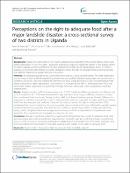Perceptions on the right to adequate food after a major landslide disaster: a cross-sectional survey of two districts in Uganda

View/
Date
2015-04-25Author
Rukundo, Peter M
Iversen, Per O
Andreassen, Bård A
Oshaug, Arne
Kikafunda, Joyce
Rukooko, Byaruhanga
Metadata
Show full item recordAbstract
Despite the instruments on the right to adequate food adopted by the United Nations, there exists
limited information on how this right is perceived. Following a major 2010 landslide disaster in the Bududa district
of Eastern Uganda and the resettlement of some affected households into the Kiryandongo district in Western
Uganda, we surveyed both districts to explore perceptions about the right to adequate food among households
with different experiences; disaster-affected and controls.
Methods: We deployed qualitative and quantitative techniques to a cross-sectional survey. The index respondent
was the head of each randomly selected household from the landslide affected communities and controls from a
bordering sub-county. Data was collected by interviews and focus group discussions (FGDs). Structured entries were
tested statistically to report associations using Pearson’s Chi-square at the 95% CI. Information from FGDs was
transcribed, coded, sequenced and patterned. Findings from both techniques were triangulated to facilitate
interpretations.
Results: Analysis included 1,078 interview entries and 12 FGDs. Significant differences between the affected and
control households (P < 0.05) were observed with: age; education level; religious affiliation; existence of assets
that complement food source; and having received relief food. Analysis between groups showed differences in
responses on: whether everyone has a right to adequate food; who was supposed to supply relief food; whether
relief food was adequate; and preferred choice on the means to ensure the right to adequate food. FGDs
emphasized that access to land was the most important means to food and income. Affected households desired
remedial interventions especially alternative land for livelihood. Despite the provision of adequate relief food
being a state’s obligation, there was no opportunity to exercise choice and preference. Comprehension and
awareness of accountability and transparency issues was also low.
Conclusion: Though a significant proportion of participants affirmed they have a right to adequate food, relief
food was largely perceived as insufficient. Given the high regard for land as a preferred remedy, a resettlement
policy is of the essence to streamline post-landslide displacement and resettlement. Information materials need
to be assembled and disseminated to stimulate awareness and debate on the right to adequate food.
URI
https://doi.org/10.1186/s12914-015-0047-xhttps://kyuspace.kyu.ac.ug/xmlui/handle/20.500.12504/756
